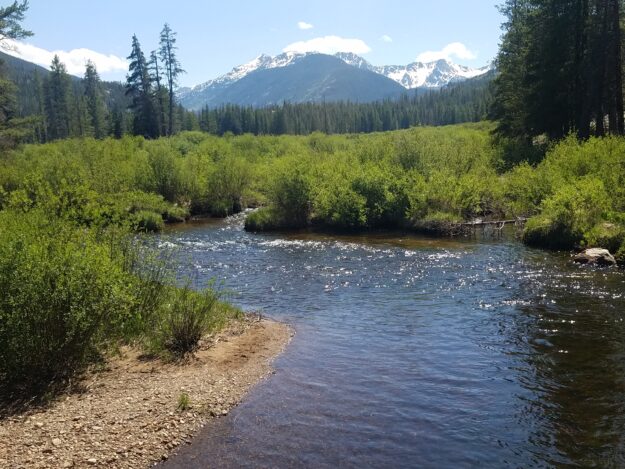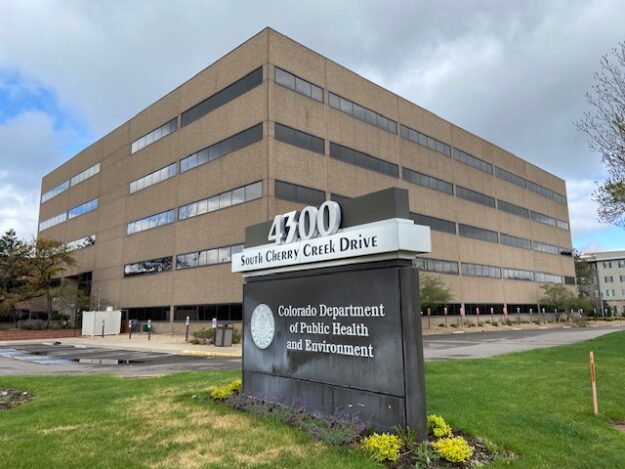Widgetized Section
Go to Admin » Appearance » Widgets » and move Gabfire Widget: Social into that MastheadOverlay zone
Roberts leads Western Slope charge to protect, preserve Colorado water

Homestake Creek in Eagle County (David O. Williams photo).
For state Sen. Dylan Roberts (D-Frisco) “protecting and securing our water future is the most important issue and biggest challenge facing our state for the next several decades.”
So as the current legislative session circles the proverbial drain, he’s been pushing hard to secure funding for water projects, enact the recommendations of the Colorado River Drought Task Force, and, perhaps most critically, replace wetlands protections stripped away by the Trump-stacked U.S. Supreme Court in last year’s highly controversial Sackett v. EPA decision.

That ruling, which backed an Idaho couple who didn’t want to get a U.S. Army Corps of Engineers wetlands dredging permit, gutted decades of federal Clean Water Act protections for fully two-thirds of Colorado’s vital wetlands and streams, according to Colorado Attorney General Phil Weiser’s brief filed in support of those protections.
Colorado lawmakers this session stepped into that regulatory void with two competing bills – a rarity in the Colorado Legislature, according to Roberts. The Regulate Dredge and Fill Activities in State Waters bill (HB24-1379), sponsored in the House by Speaker Julie McCluskie (D-Dillon) requires a rulemaking by the Colorado Department of Health and Environment’s Water Quality and Control Division to permit dredge and fill activities on both public and private land.
The competing bill (SB24-127) from Republican state Sen. Barb Kirkmeyer (R-Brighton) known as the Regulate Dredged & Fill Material State Waters bill, was backed by the Colorado Association of Homebuilders. Environmental groups and some Democrats said the Kirkmeyer bill fell short of replacing longstanding federal protections for wetlands for several reasons.
“We reached an agreement with Sen. Kirkmeyer and some of the folks that she was working with on her bill,” Roberts said in a phone interview. “She is going to join me as the co-prime sponsor on the bill with the Speaker and let her Senate bill go. So, we’ve gotten to a really good place … We just made a few final amendments that got Kirkmeyer on board, but the environmental advocates are very pleased with where we stand.”
On Monday, the full Senate passed the new version of HB24-1379 and sent it back to the House, which then repassed it after considering amendments.
“We could not be more proud of the fact that Colorado is the first state in the nation to pass legislation that restores protections to our wetlands and streams that were overturned by Trump’s Supreme Court,” Conservation Colorado’s Senior Water Campaign Manager Josh Kuhn wrote in an email. “Our coalition and the bill sponsors worked to negotiate several significant compromises that led to the legislation we see today, and it remains a win for the environment.” Proponents hope the Colorado bill will become a national model.
Two of Kuhn’s biggest criticisms of the original Kirkmeyer bill was its “political line” saying waters outside of 1,500 feet from the historical floodplain would be unprotected, and its regulatory structure requiring a new agency in the state’s Department of Natural Resources.
“That’s not in our House bill,” Roberts said. “Our House bill is much more based on the actual wetland and the connection to Colorado waters and basically what the Army Corps was doing. So, the arbitrary line in the Kirkmeyer bill was a huge problem, and that is certainly not in the House bill. And it’ll stay with CDPHE, the Water Quality Control Commission.”
Asked if there was a concerted development industry effort to muddy the waters with the competing bill filed before the Speaker’s House bill, Roberts had this to say:
“It was an interesting tactic,” he said. “A lot of state legislatures, and obviously Congress does this, where there are similar bills that start in opposite chambers and they kind of compete with each other. That doesn’t normally happen here, but it was kind of interesting to have it play out that way this year.”
After publication, CTR received a press release from Kirkmeyer stating the original House bill called for more protections than were in place before the Supreme Court ruling. and that proponents of her bill feared impacts to farming, mining and other operations and that “it would stop development throughout the state at the same time lawmakers are trying to figure out how to build sustainable housing in partnerships with local governments.”
Kirkmeyer, also worried about the current backlog of permits at the CDPHE due to a lack of funding, lauded the compromise bill’s quarterly report requirement for the CDPHE to the Joint Budget Committee, which Kirkmeyer serves on. If necessary, she said in the release, the JBC would “make sure that they have the resources necessary to be successful with this program.”
“Colorado is a headwaters state, and our rivers supply millions of people in the United States with water needed for drinking, agriculture, industry and outdoor recreation,” Kirkmeyer added in the release. “We are proud that this bill will protect our environment and protect critical investments in affordable housing as our state grows towards a responsible future.”

Roberts is also a bipartisan co-prime Senate sponsor with Sen. Cleave Simpson 9R-Alamosa) of a bill (HB24-1436) –Sports Betting Tax Revenue Voter Approval – that refers to a ballot measure asking voters in November if the state can spend additional sports betting tax revenue (above the current $29 million annual cap) on water-conservation projects. The bill passed out of both chambers and now heads to the desk of Gov. Jared Polis for his signature.
First established by voter approval of Proposition DD in 2019, the Water Plan Implementation Cash Fund goes toward water storage and supply, agricultural projects, and watershed health and recreation projects.
“If we don’t [pass HB24-1436], we’ll have to refund the excess to the casinos,” Roberts said. “So I hope it’s a really easy question for voters, and that they would prefer the money go to water rather than back to the casinos.”
Roberts was also the sponsor of the annual water projects bill, which allocates $56 million to the Colorado Water Plan and various water infrastructure projects. More than half of that money currently comes from sports betting, and this year $20 million of it will go toward acquiring the Shoshone power plant water right from Xcel Energy to keep that non-consumptive right on the Western Slope for farmers, boaters, and aquatic life along the endangered Colorado River.
Finally, Roberts was co-prime Senate sponsor, along with Sen. Perry Will, R-New Castle, of SB24-197 (Water Conservation Measures) that implements several key recommendations of the Colorado River Drought Task Force, including the ability to loan water to an instream flow loan program for stream health and restoration, as well as protections for agricultural water.
The bill, which has cleared both the Senate and the House, will also allow power companies near the Yampa River in Northwest Colorado to temporarily loan their water to the river while they explore different types of energy development in a post-coal world, as well as enhance the ability of Colorado’s native tribes to get more funding for water projects using historic water rights.
Editor’s note: This story first appeared on the Colorado Times Recorder website.


